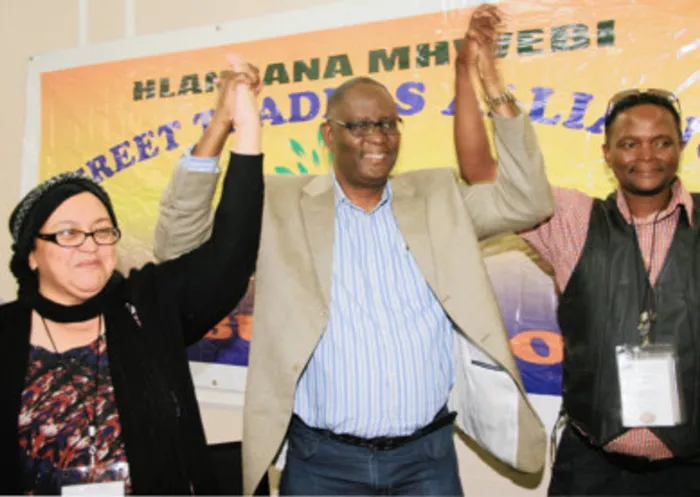‘Informal traders should invade malls’

Seen here at the recently lauched of the South African Informal Trader's Alliance (SAITA) from left are Rosheda Muller (Deputy President), Zwelinzima Vavi (Cosatu General Secretary) and Thabiso Pita (President). Approximately five members from each province were represented for the election of the new committee. Picture: Soraya Crowie Seen here at the recently lauched of the South African Informal Trader's Alliance (SAITA) from left are Rosheda Muller (Deputy President), Zwelinzima Vavi (Cosatu General Secretary) and Thabiso Pita (President). Approximately five members from each province were represented for the election of the new committee. Picture: Soraya Crowie
Informal traders in Kimberley should invade the malls and other key centres of the city to ply their trade from there instead of allowing themselves to be pushed to the dirty and less desirable business areas.
This is according to the national general secretary of Cosatu, Zwelinzima Vavi, who yesterday told a group of informal traders in Kimberley to fend off all efforts by “white capital to squeeze them out” of their businesses.
“White capital is your enemy. It is these big retail companies in various sectors of our economy, including in the bread, dairy, pharmaceutical and in other industries, that are colluding with each other to keep you out of the market.
“They pay workers meagre salaries and even exclude you from their malls. As informal traders, you must be able to operate directly from these malls and from areas in the city where you can make profit,” Vavi said.
The group of informal traders had convened in Kimberley to launch the South African Informal Traders Alliance (Saita), which is an organised body representing the interests of informal traders in the country.
Vavi said that the biggest problem for informal traders and small businesses in the Province was big business that was even encroaching in the townships and shutting down small businesses owned by locals.
“We wonder why these big companies fought against residents freedom because akumnadi (it is nice) in this democracy! They used to fear us because they thought we would implement the Freedom Charter (ANC policy document that speaks of nationalisation) but now they are smiling.
“It is so good for them in this democracy because they can now operate from the townships. Under apartheid, at least, they were only operating in their own area. Economic freedom is escaping us 19 years into democracy. We cannot continue to boast about political freedom when economic benefits still reside with the whites,” Vavi said.
He said that the “squeeze” of informal traders out of business by “white capital” was leading to a number of social problems in the Province, including xenophobic tensions between people of the Northern Cape and small foreign national traders that were operating from the townships.
“Our people who previously used to own shops, are now mere collectors of rent at these shops because most of the shop owners are communing from outside the country. This feeds into possible xenophobic (incidents).
“But the anger that you have is directed towards the wrong place (foreign nationals) . . . we are not correctly identifying the enemy. We must direct our anger towards white capital, because it is the enemy here,” Vavi said.
He also said that the tendency by “white companies” to retrench workers and “casualise” some of their functions with the aim of boosting profits, has led to people losing their jobs and joining the ranks of the informal trading sector.
“We are sitting with an unbelievable crisis of unemployment. Statistics SA has recently reminded us that unemployment in the country has reached 36.7 percent . . . four people out of the 10 you see do not have jobs. This has led many to join the informal trading sector as hawkers, vendors and other such traders,” Vavi explained.
He pointed out that Saita had to hit the ground running on a number of important issues affecting informal traders, including the laws that govern the sector, a collective benefit scheme for members (informal traders) who need to retire due to old age, negotiating with municipalities on trade regulations and working with Cosatu.
“Among other things, Saita must organise informal traders in the Province and ensure that Saita fight for them to have access to financial assistance, trading rights and other such important things,” Vavi said. - Diamond Fields Advertiser